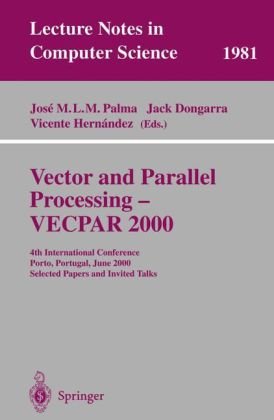

Most ebook files are in PDF format, so you can easily read them using various software such as Foxit Reader or directly on the Google Chrome browser.
Some ebook files are released by publishers in other formats such as .awz, .mobi, .epub, .fb2, etc. You may need to install specific software to read these formats on mobile/PC, such as Calibre.
Please read the tutorial at this link: https://ebookbell.com/faq
We offer FREE conversion to the popular formats you request; however, this may take some time. Therefore, right after payment, please email us, and we will try to provide the service as quickly as possible.
For some exceptional file formats or broken links (if any), please refrain from opening any disputes. Instead, email us first, and we will try to assist within a maximum of 6 hours.
EbookBell Team

4.4
32 reviewsThis book is the ?nal outcome of VECPAR 2000 – 4th International Meeting on Vector and Parallel Processing. VECPAR constitutes a series of conferences, which have been organized by the Faculty of Engineering of the University of Porto since 1993, with the main objective of disseminating new knowledge on parallel computing. Readership of This Book The book is aimed at an audience of researchers and graduate students in a broad range of scienti?c areas, including not only computer science, but also applied mathematics and numerical analysis, physics, and engineering. Book Plan From a total of 66 papers selected on the basis of extended abstracts for p- sentation at the conference, a subset of 34 papers were chosen during a second review process leading to their inclusion in the book, together with the invited talks. The book contains a total of 40 papers organized into 6 chapters, where each may appeal to people in di?erent but still related scienti?c areas. All ch- ters, with the exception of Chapter 6, are initiated by a short text, providing a quick overview of the organization and papers in the chapter. The 13 papers in Chapter 1 cover the aspects related to the use of multiple processors. Operating systems, languages and software tools for scheduling, and code transformation are the topics included in this chapter, initiated by the talk on computing over the Internet, entitled Grid Computing,byIan Foster.